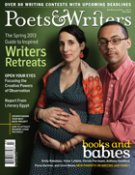Published from 1934 to 2003 in New York City by William Phillips and Philip Rahv, the fiercely intellectual and highly literary Partisan Review remains a great influence on politically engaged literary magazines. According to Mark Greif, cofounder of the Brooklyn-based journal n+1 (nplusonemag.com), “the virtue of Partisan Review…was that it inspired other magazines.” Founded in 2004 as a direct descendant of Partisan Review, each triannual issue of n+1 is a fascinating, frustrating mixture of politics, literature, and criticism. Issue 15, which carries the theme “Amnesty,” is no exception and features an essay by Benjamin Kunkel on politico-psychopathology, a review by Jeremy Kessler of the new health-insurance mandate, original fiction from Russian novelist Mikhail Shishkin, and critical satire about “dead white magazines.” Queries and submissions for both the print journal and the website are accepted year-round by e-mail.
Founded in Somerville, Massachusetts, in 1975 as a small literary-arts quarterly, Boston Review (bostonreview.net) has since grown into a glossy, politics-driven publication released six times a year. The journal also manages the Boston Review Books imprint and co-hosts the Ideas Matter lecture series with the political science department at MIT, where the Boston Review offices are located. Self-described as “putting politics and poetry on the same page,” Boston Review is known for publishing enlightening forums with writers on a single political subject, as well as a host of poetry, fiction, and reviews. The most recent issue features a special section on democracy in Latin America, new fiction from Ben C. Stroud, and poetry from Mary Hickman, Andrew Elliott, and Lisa Russ Spaar. The editors—including poet Timothy Donnelly and recent MacArthur “Genius” Fellowship winner Junot Díaz—often pluck submissions from the slush pile, says marketing and publicity director Daniel Pritchard. “Our fiction and poetry editors are very invested in new voices.” The magazine accepts poetry, fiction, and creative nonfiction submissions online and by mail year-round, and the annual Boston Review Poetry Contest, which offers a prize of $1,500 and publication in the journal, is open until June 1.
Recently departed editor Ted Genoways turned the Virginia Quarterly Review (vqronline.org) into one of the nation’s most respected venues for narrative journalism. Though Genoways is no longer at the helm—VQR plans to announce a new editor at the AWP conference this month in Boston—the publication seems to be continuing in the same editorial direction, with a fascinating Fall 2012 issue titled “The Female Conscience” and the new Winter 2013 “Classic Hollywood” issue exposing the backbone of our cinematic history, including an essay from Bret Lott on the innovative Hollywood executive Frank Price and an interview with legendary screenwriter and playwright Horton Foote. Fiction for the forthcoming Spring 2013 “Business of Literature” issue will be guest edited by novelist Richard Bausch. VQR is currently accepting submissions online and by mail.
Established in 1987 in Detroit, the issue-oriented magazine Witness (witness.blackmountaininstitute.org) has since 2007 been published by the Black Mountain Institute at the University of Nevada in Las Vegas, which puts out one themed print issue and two general online issues each year. The journal, which seeks to highlight “the modern writer as witness to his or her times,” has covered themes such as civil rights, religion, exile, and the 1960s. “The work we publish may not seem overtly political,” says new editor in chief Maile Chapman, “but our editors believe that insightful literary writing engages the human condition in deep and unexpected ways.” The new 2013 print issue tackles the theme “Redemption,” with poetry by Fiona Sze-Lorrain marking the death of Kim Jong-il, and fiction by Joel Fishbane concerning refugees from Mugabe’s Zimbabwe. The next print theme will be “Ghosts.” Witness invites submissions of poetry, fiction, and creative nonfiction online via Submittable. Visit the website for reading periods and guidelines.
Travis Kurowski is completing a book on the literary magazine, due out this year from Atticus Books. His website is traviskurowski.com.









